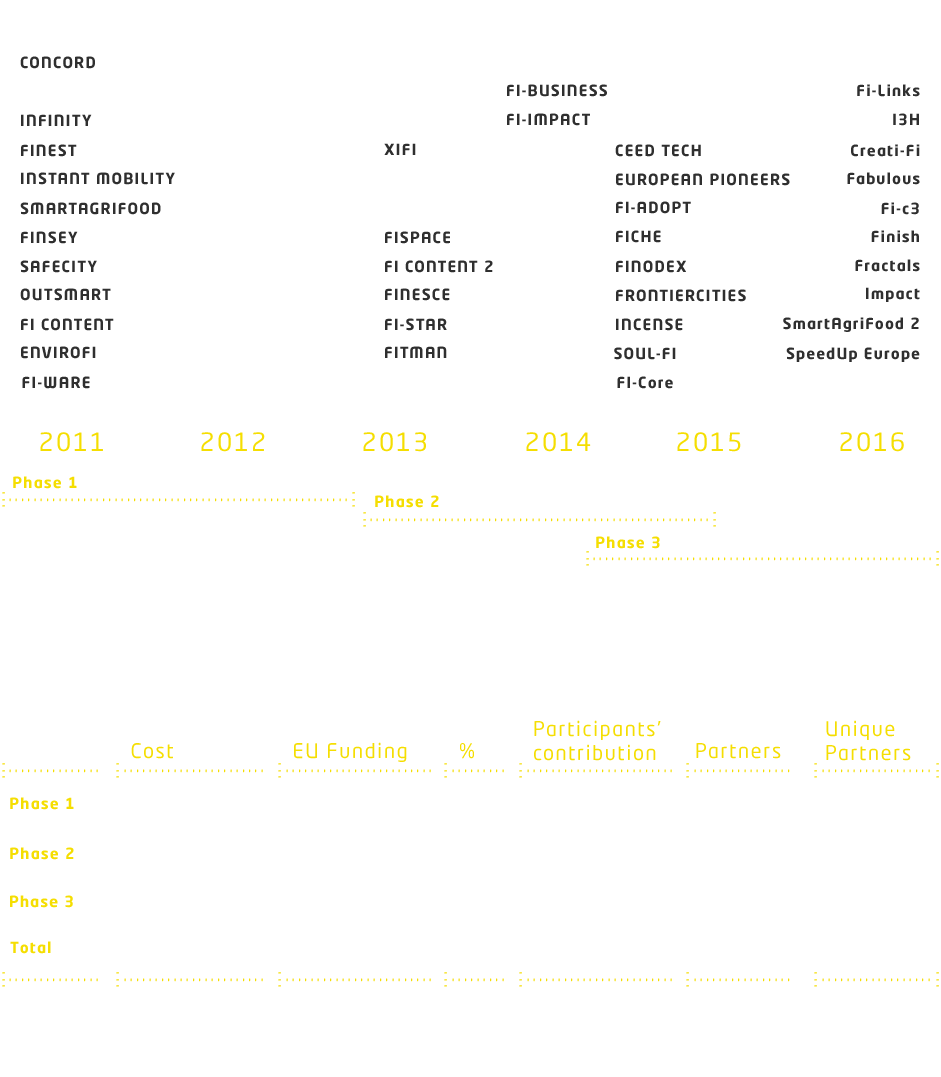Led by industry, driven by users Addressing the challenge of Internet development in Europe
With over a billion users worldwide, the Internet is one of history’s great success stories. However, today’s Internet was designed in the 1970s, for purposes that bear little resemblance to current and future usage scenarios. Many challenges in the areas of technology, business, society and governance will have to be overcome if the future development of the Internet is to sustain the networked society of tomorrow.
To face these challenges, in 2011, the European Commission launched the Future Internet Public-Private Partnership Programme (FI-PPP). The main goal is to advance a shared vision for harmonized European technology platforms and their implementation, as well as the integration and harmonization of the relevant policy, legal, political and regulatory frameworks. As set forth in the Digital Agenda for Europe, these are considered to be prerequisites to build an inclusive knowledge society.
/ About
The Future Internet Public-Private Partnership (FI-PPP) is a European programme for Internet innovation. It is aimed at accelerating the development and adoption of Future Internet technologies in Europe, advancing the European market for smart infrastructures and increasing the effectiveness of business processes through the Internet.
It follows an industry-driven, user-oriented approach that combines R&D on network and communication technologies, devices, software, service and media technologies; and their experimentation and validation in real application contexts. It brings together the demand and supply sides, and it involves users early into the research lifecycle. The platform technologies will be used and validated by many actors, in particular by small and medium-sized companies and public administrations.

Thus, the effectiveness of business processes and infrastructures supporting applications in areas such as transport, health or energy can be increased; leading to the creation of innovative business models that strengthen the competitive position of the European industry in sectors such as telecommunication, mobile devices, software and services, and content provision and media.
The whole process has been divided into three stages.
/ Phase 1 (90 M€ European investment)
It was aimed to define the technological foundation (May 2011-April 2014) and create 8 use case projects (April 2011-March 2013). This technological core of the FI-PPP is called FIWARE and is built to facilitate access to services, cloud hosting, Internet of Things connection, data and context management or security. During this phase, infrastructures were tested and evaluated, and large amounts of reference architecture were to be created.
- Laying the technology foundation.
- Defining "use case scenarios" in different industry sectors, such as transport, agriculture, smart cities, environment, creative industry and several more.
- Making an inventory of available (public) infrastructures via capacity building.
- Integrated programme support to good governance and open communication.
/ Phase 2 (80 M€ European investment)
This phase (April 2013-March 2015) was aimed to develop
the core platform through the XIFI project and the implementation of FIWARE nodes. Large scale trials tested the versatility of the platform components in specific usage domains.
- Developing large-scale use case pilots and platforms in the domains of energy, argifood & logistics, creative industry, smart manufacturing and health & wellbeing.
- Setting up infrastructures to operate a European network of FIWARE nodes, known today as the FIWARE lab.
/ Phase 3 (100 M€ European investment)
The third phase of the FI-PPP (September 2014-September 2016) is very much focused on entrepreneurs, startups and SMEs. It is aimed at improving a stable infrastructure for the large-scale trials and at creating a sustainable ecosystem for SME-driven innovation through the selection of 16 business accelerators (FIWARE Accelerator Programme).
- Expansion of use cases by developing applications and services
- Extending the technology foundation
- Launch of the FIWARE Accelerator Programme with more than 1000 entrepreneurs, startups or SMEs benefiting.




